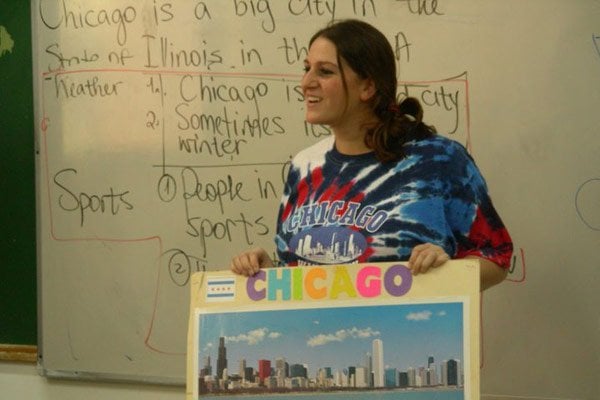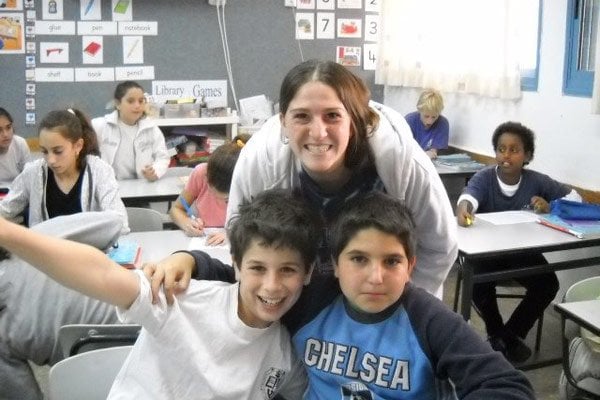Why did you decide to volunteer in Israel with OTZMA?
Rachel: I knew that I wanted to spend significant time in Israel but I wasn’t sure how to choose a program. I had a family friend who participated on OTZMA Israel which is how I first heard about it. Then I started to explore it even further. I had just graduated from Indiana University with a BA in English and like any English major the question in my mind was – well what next? What do I want to do with this degree? I wasn’t sure if I wanted to get my masters in Education eventually and become a teacher or if I would enjoy office work better…
So, the first thing that really attracted me to the program was the diverse opportunities – I was able to volunteer in schools to teach English (and so many other things too) and had the opportunity to do an internship. This way I was able to experience different types of work to help me figure out what kind of work I like doing.
The second thing that attracted me to OTZMA Israel was the “second track” of the program where we were able to spend time in our “partnership cities.” Most cities in the US (and many other countries too) have partnerships with smaller cities in Israel. I’ve always been involved with Chicago’s partnership which is actually a whole region and not just one city - Kiryat Gat-Shafir-Lachish. So, when I saw that I would be spending 3 months in the region, I knew this was the right program for me because I loved my previous experiences and work in that area (I had been there twice already in the summer to volunteer at an English speaking camp).

The third thing that I liked about this program was the educational components to it. Although it was a program where you sort of designed your own volunteer activities – we also had seminars with our group quite often. We learned a lot about political issues in Israel, the minority populations in Israel, and we really got to see different parts of Israel that tourists and most other people don’t get a chance to see.
Describe your day to day activities as a volunteer.
Rachel: This is a bit tough because there were 3 tracks and some times my volunteer work changed day to day. I will break it down by tracks as to what my days looked like.
Track 1 – Learning Hebrew and Acclimating to Israeli culture, language, life, etc.
9 am – 1 pm: Intensive Hebrew classes (5 days a week)
Volunteer component: The volunteering in track one was meant to be short because it was really time to get acclimated to the country and to become friends with the group. I personally volunteered a few times a week for a couple hours at the beach helping with the kayaking, sailing, and wind surfing classes for kids.
Track 2 – Partnership Region
I can’t remember exactly but…3-4 days a week I helped teach English at an elementary school for the entire school day. I would either sit in the class with the teacher and help teach the lesson or I would take a group out of the class to work on things.
- 1 day a week I volunteered at a high school helping kids who were behind catch up with the rest of the class – this would be for about 2 hours
- 1-2 days a week I worked at a community garden where I helped plant seeds and maintain the garden. The person who ran the garden would go around handing out food to those who were really in need in the community
- 1 night a week I met with a group of “at risk” teens – I didn’t do any work with them but I got to hang out and get to know the kids once night a week at their weekly fire-pit where they would talk, drink tea, make pita…etc.
This program is really cool and very unique. It’s kind of a long explanation and I will do the best I can at writing it: The program is called Sachi. It started with 2 men who were troubled by the amount of teens at risk of getting involved with bad things (such as drinking, drugs, violence). A lot of these kids have very little money and have parents or just one parent who are too busy surviving and helping their family to survive to really have time to give their kids structure after school. So, they decided to go in an area where there were a lot of these kids, set up a fire, make tea, and just let them come hang out and talk.
Once kids kept coming back they started a program with them. Rather than tell them why there were troublemakers or that they were the ones who needed help, they decided to start discussing with them issues in their community and what they can do to help them. He and the kids one day went to the grocery store, spent $100 on groceries, and decided on a family in the community who could really use this money. They were not allowed to tell people that they were in this club, and were especially not allowed to tell people who they helped and couldn’t even tell the people who received the food where it was coming from.
So, they would pull up to the house, drop the food on the door step ring the bell and run off (while one kid would hide somewhere nearby just to make sure they took the food). This made the kids feel like they were actively doing something to help others and that they were part of some cool secret club. It was almost like they were doing something wrong because of the secrecy but they were actually doing something incredible. This formed more and more and now they do a lot of projects. There was a known homeless man in the area that they provided shoes and a jacket to in the winter and things like that. There was a man with no electricity in his home so they went in and installed everything for him and filled his fridge. In this last case, the man knew where the help was coming from because they had to get into his home. So – the group meets twice a week.
Once to do projects and one night just to be together at the fire pit. So not only does this group help people in the neighborhood who need it, but they also help the kids have a purpose rather than let them be bored on the streets where they can be introduced to drugs and alcohol. The staff members told me that since these kids started participating in their program – more of them actively go to school (rather than ditch classes) and give more respect to their parents.

Track 3 – Internship
This was pretty much like a regular job – worked from 9-5 at an organization called “Stand With Us” which does Israel advocacy. I helped them do a lot of stuff on facebook and helped plan conferences with groups that were in Israel on a program.
What made this experience unique and special?
Rachel: We were in much smaller communities in Israel which is pretty unique to some of the other Israel volunteer programs. There were also a lot of educational seminars which made it really special. The best part is each person made their own experience – I made the best of it and volunteered a lot because that’s what I wanted to do.
How has this experience impacted your future?
Rachel: I learned a lot about myself on this program and was able to take a year after college to really reflect on who I am and what I wanted to do next in life. I never thought I’d ever work a job in the Jewish community when I got back home but here I am working for the “Jewish Agency” helping people make Aliyah (immigrate to Israel). I also have something really important and well-known (at least well known in the Jewish community since this program has been around for 26 years now) on my resume.